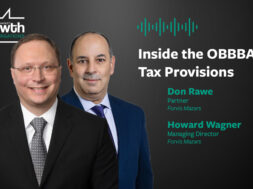SEC Official Meets with PE Firms, Outlines Regulatory Priorities
Compliance professionals from middle-market private equity firms met last fall with a senior member of the Securities and Exchange Commission to discuss the agency’s examination priorities.

Compliance professionals from middle-market private equity firms met last fall with a senior member of the Securities and Exchange Commission’s Office of Compliance Inspections and Examinations for a conversation about the agency’s examination priorities.
The meeting, hosted by ACG’s Private Equity Regulatory Task Force on Oct. 2 in San Francisco, addressed issues that middle-market funds are facing and provided a platform for compliance officers to meet with the OCIE outside of the examination process, which often centers around document requests and the advice of counsel.
“This event was a great opportunity to engage with the SEC,” says ACG PERT steering committee member Joshua Cherry-Seto, CFO and CCO at Blue Wolf Capital Partners. “Hearing directly from a senior OCIE examiner on the issues [the OCIE is] focused on provides valuable insights for our firm’s compliance practice.”
The meeting highlighted up-and-coming issues that the OCIE is watching, along with common deficiencies that the agency has found in previous examinations.
The OCIE office conducts activities in four primary areas: promoting compliance, preventing fraud, identifying and monitoring risk, and informing policy. The office conducted over 3,150 examinations of investment advisers and others involved in the securities industry in fiscal year 2018, a pace it plans to maintain in 2020.
The OCIE generally prioritizes instances of outright fraud, misrepresentations to retail investors and risks posed by “registrants responsible for critical market infrastructure,” such as securities exchanges and clearings agencies, according to the agency’s website.
“Meeting the SEC staff gives PERT members the opportunity to learn about not only the current key regulatory issues but also what is coming down the pike.”
Scott Gluck
Special Counsel, Duane Morris LLP
However, the designated examiners of private equity and hedge funds in the OCIE’s private funds unit focus on a more specific set of issues. Up-front disclosure of fees and expenses, conflicts of interest and valuations are often reasons private equity funds receive so-called “deficiency letters” after an examination. PERT members say dialogue with regulators is essential for compliance practitioners to avoid such findings.
During the October roundtable discussion, an SEC representative spoke about those issues, along with subscription lines of credit, cybersecurity, affiliated service providers, GP-led restructurings and other areas the OCIE is watching closely.
“It is always good for middle-market private equity firms to meet with SEC staff,” says Scott Gluck, special counsel at Duane Morris LLP and PERT’s outside counsel. “This allows PERT members to learn which areas the SEC is most focused on and take steps in those areas to avoid compliance deficiencies.”
PERT, which recently became ACG’s first special interest group, is committed to increasing dialogue among middle-market private equity CFOs, CCOs, COOs and general counsels. Created as a national peer network to share best practices, PERT provides members with a monthly regulatory newsletter, access to quarterly calls covering issues such as fees and expenses, limited partner agreements and cybersecurity, plus invitations to member-only receptions and access to meetings with regulators.
“It is often difficult for middlemarket private equity firms to keep abreast of key issues that the SEC is concerned about, apart from periodic enforcement actions and speeches,” Gluck says. “Meeting the SEC staff gives PERT members the opportunity to learn about not only the current key regulatory issues, but also what is coming down the pike.”
This story originally appeared in the January/February 2020 print edition of Middle Market Growth magazine. Read the full issue in the archive.


